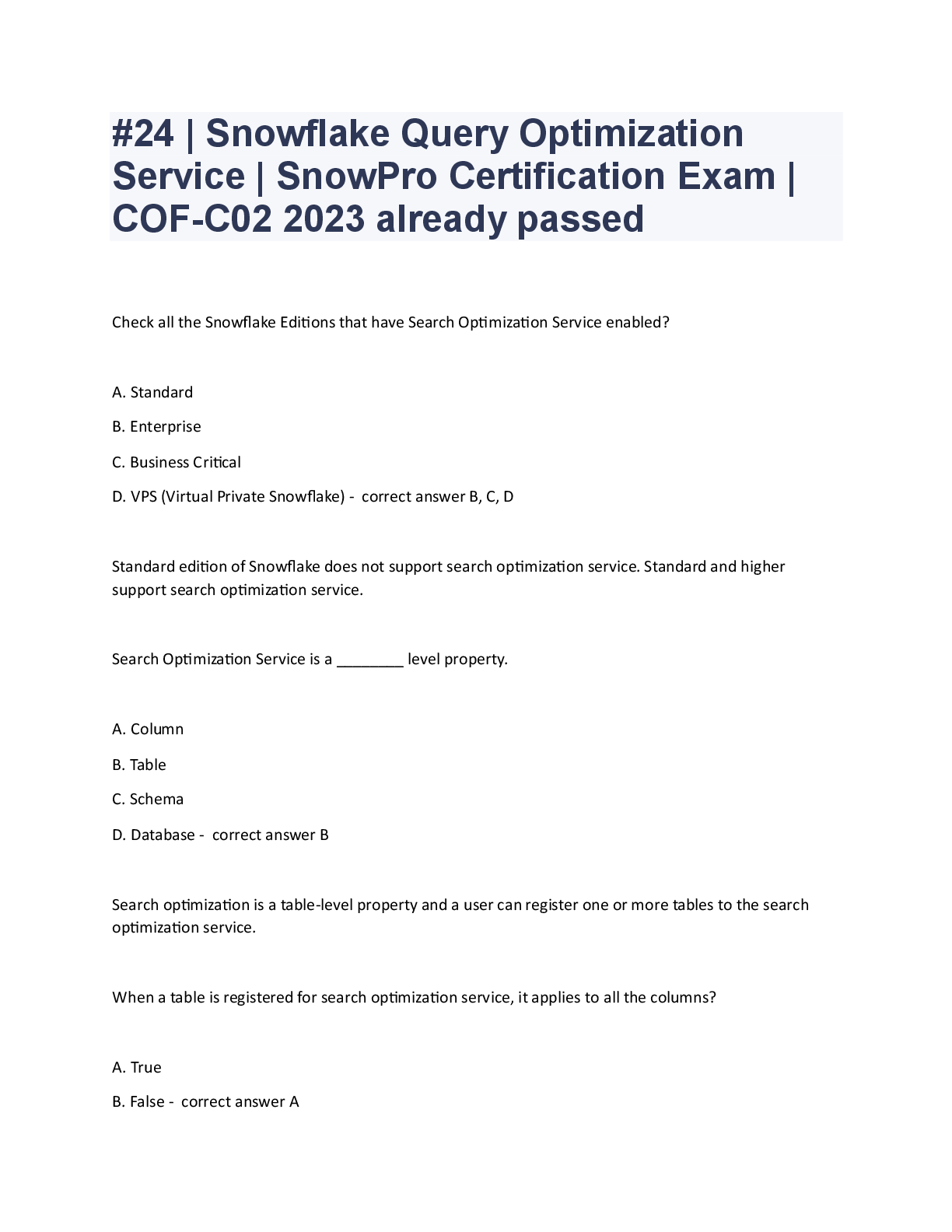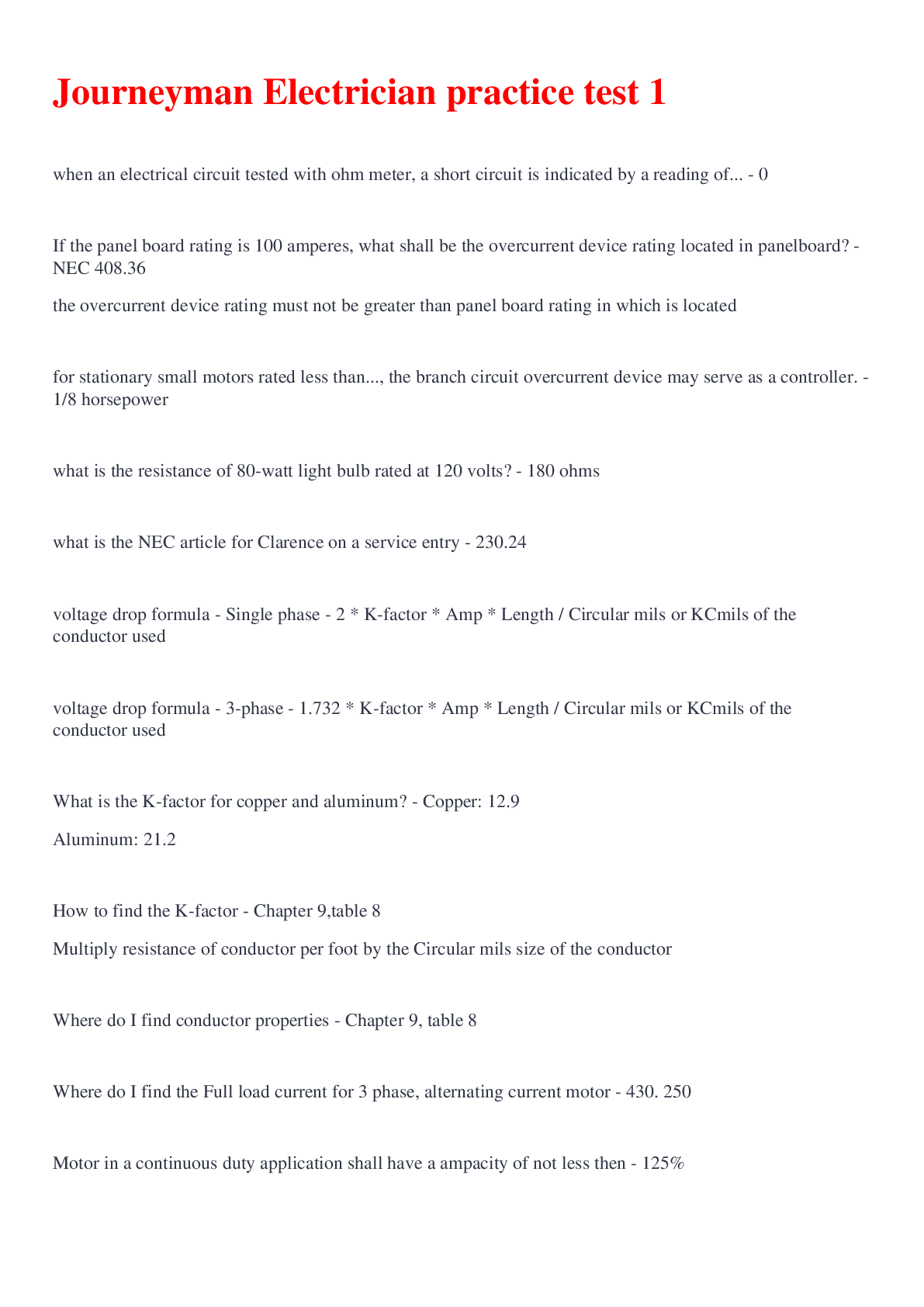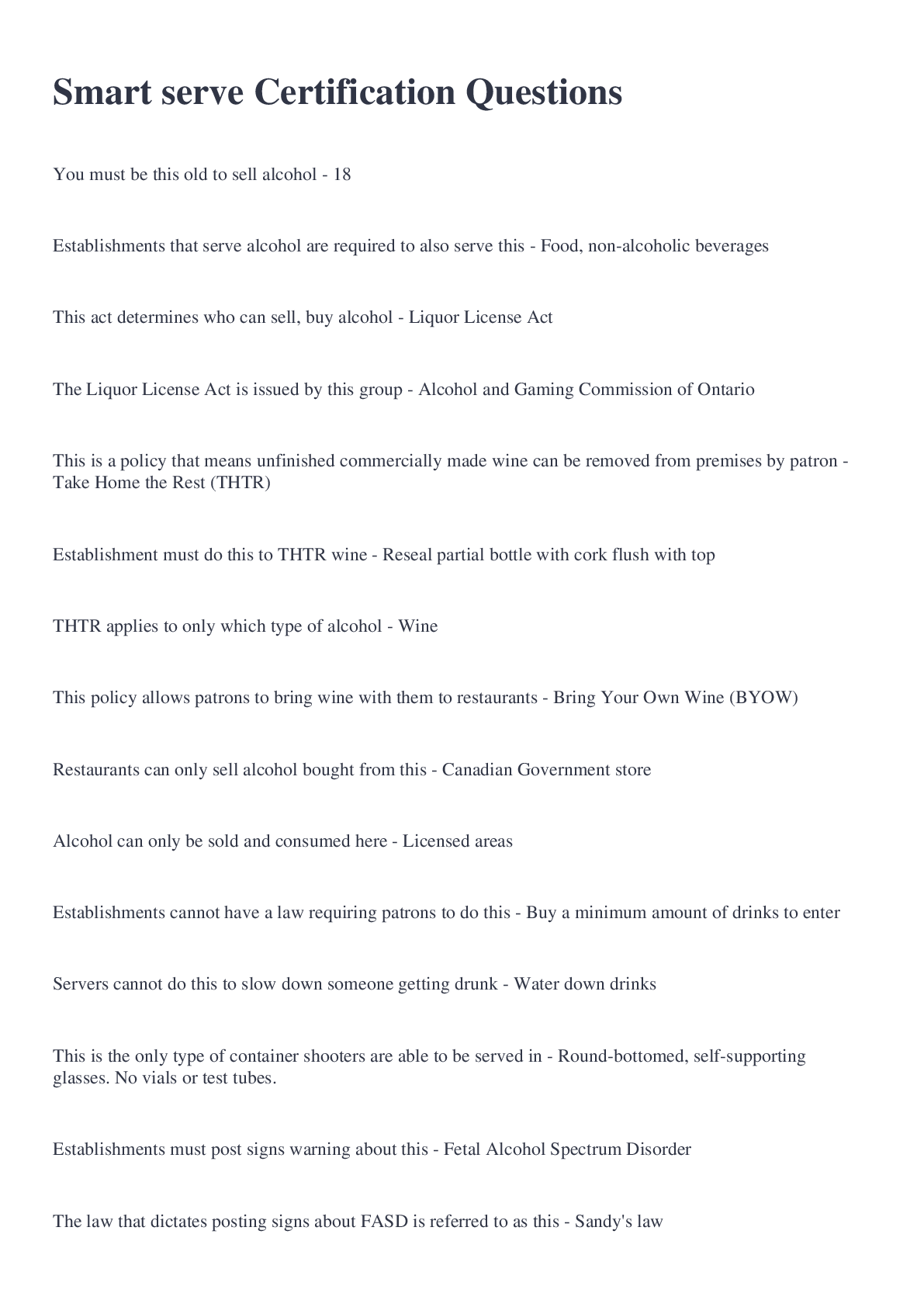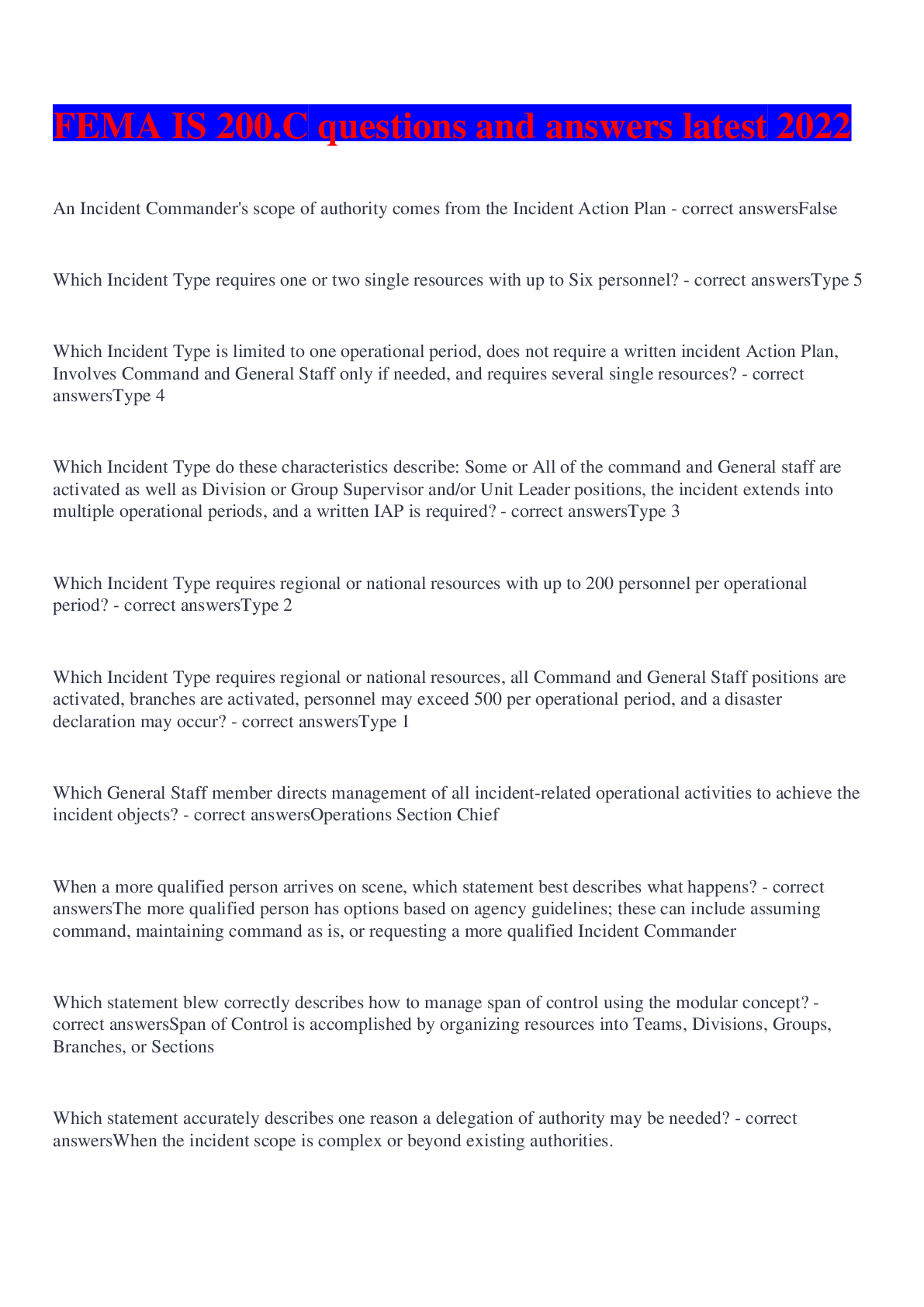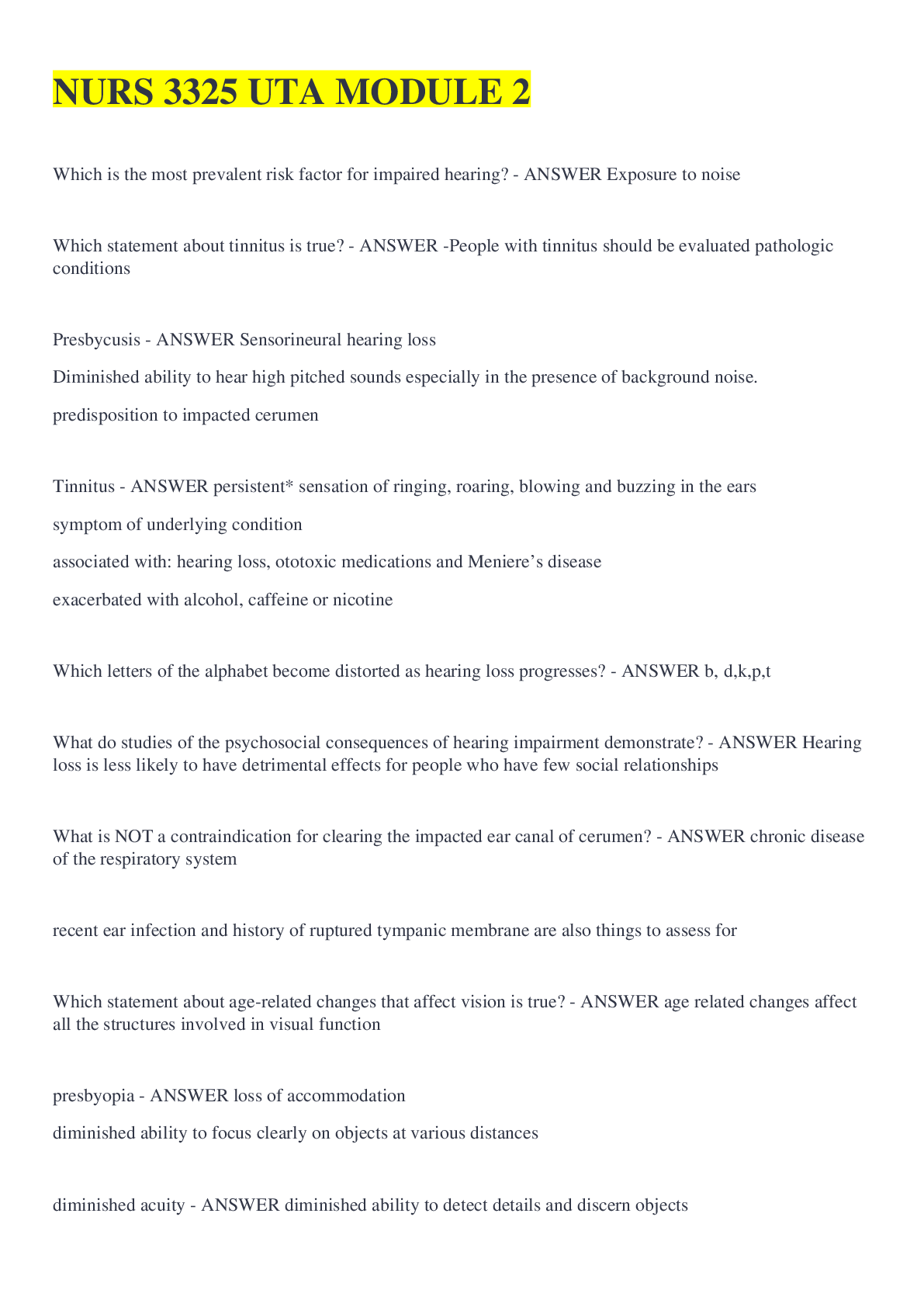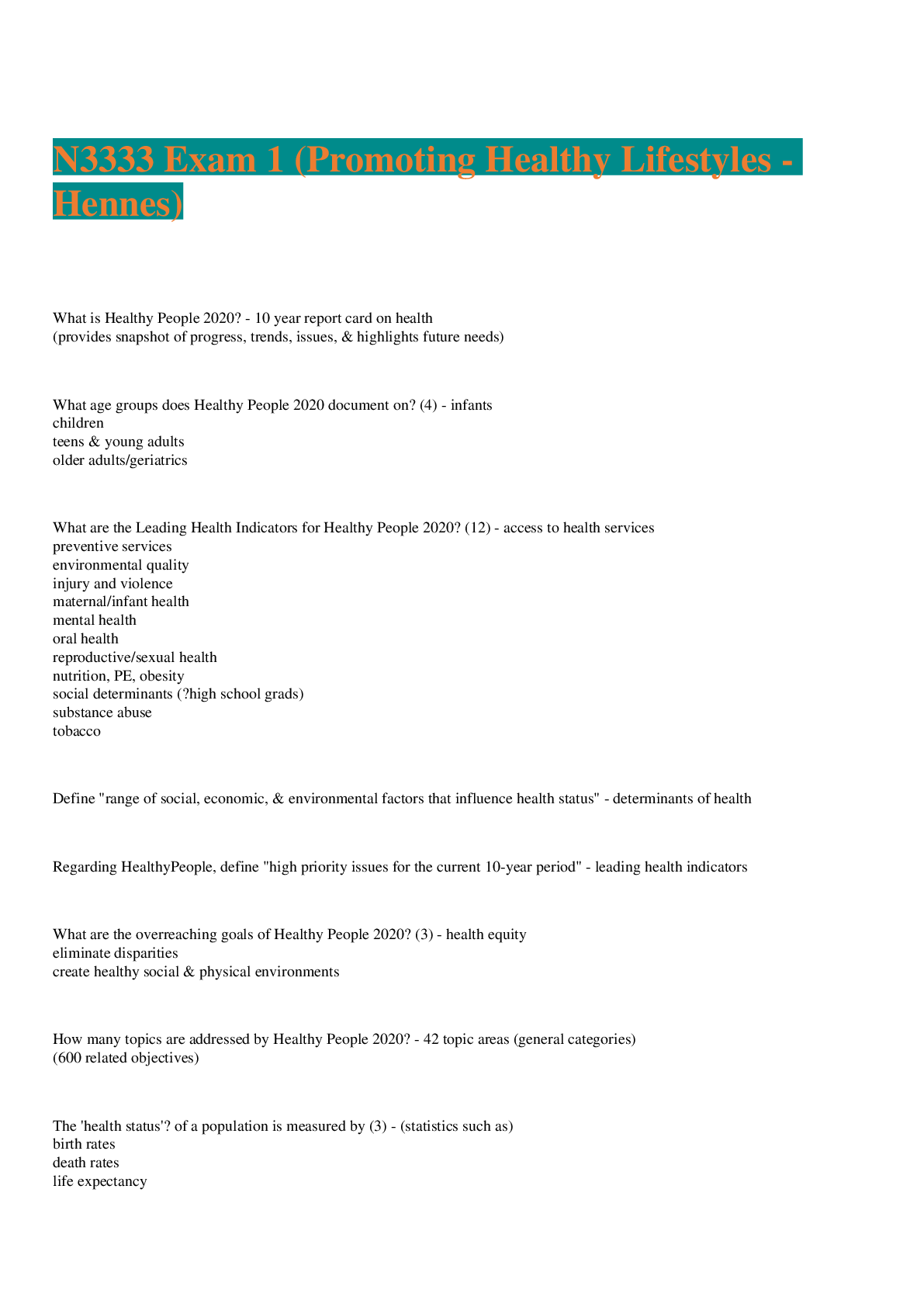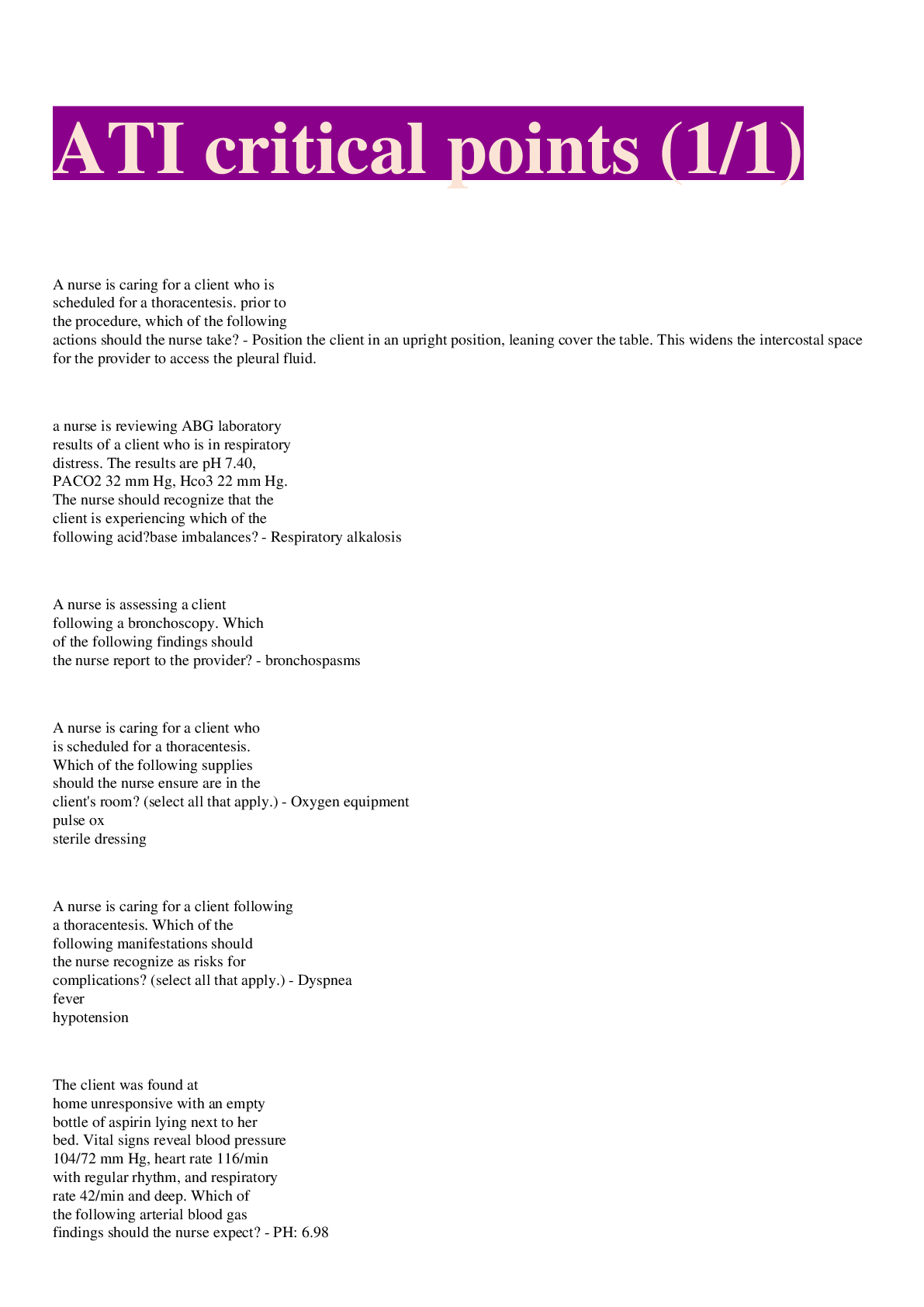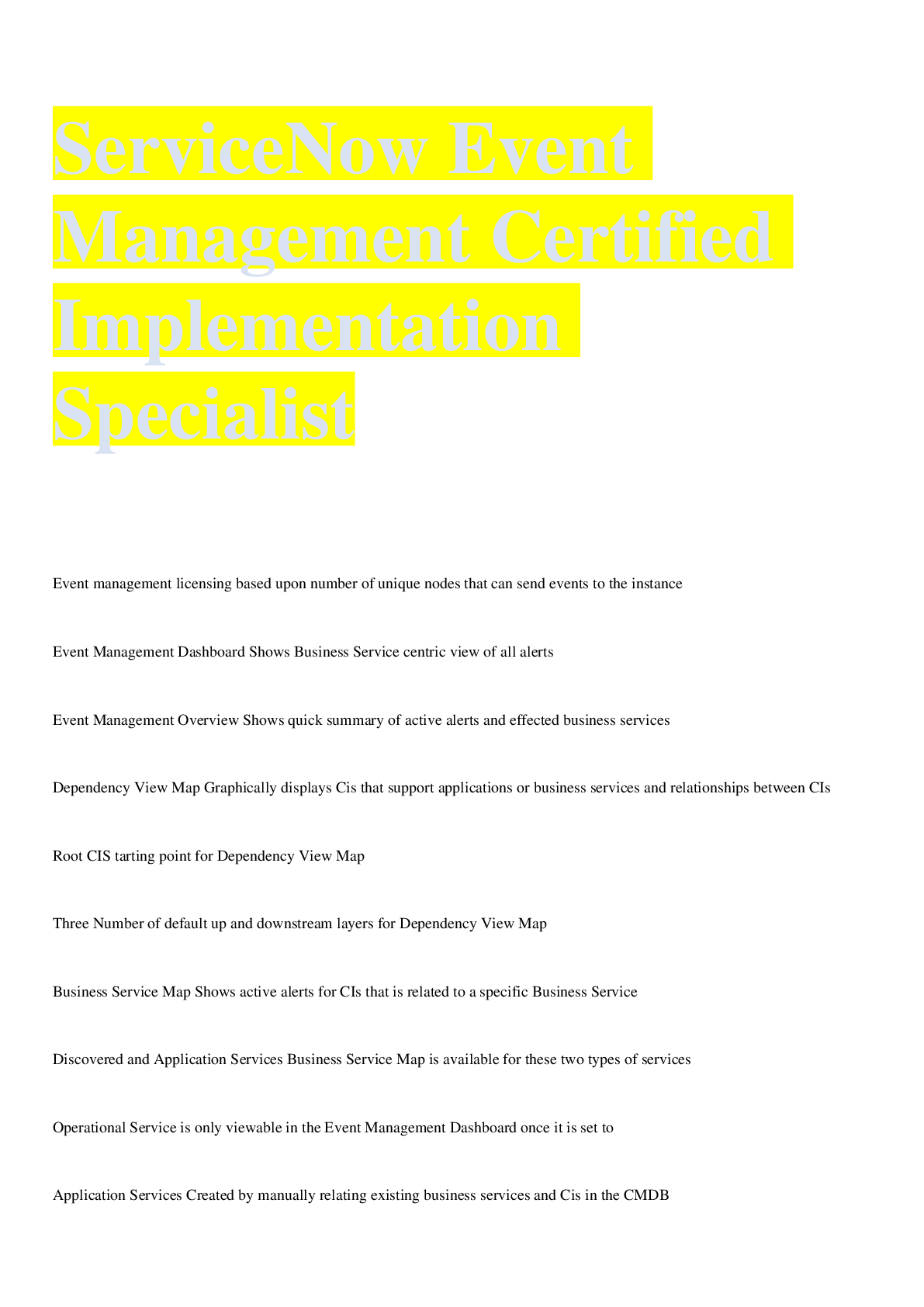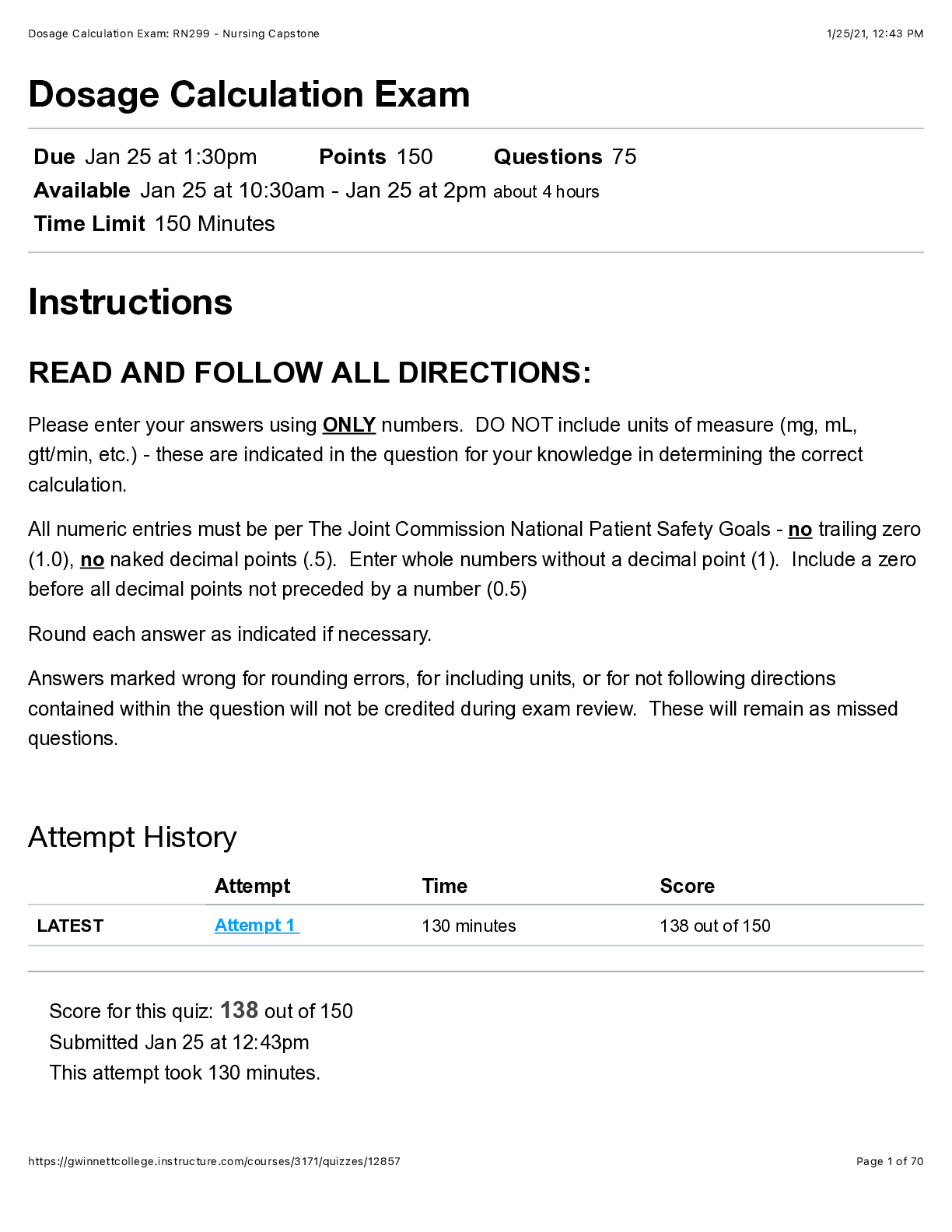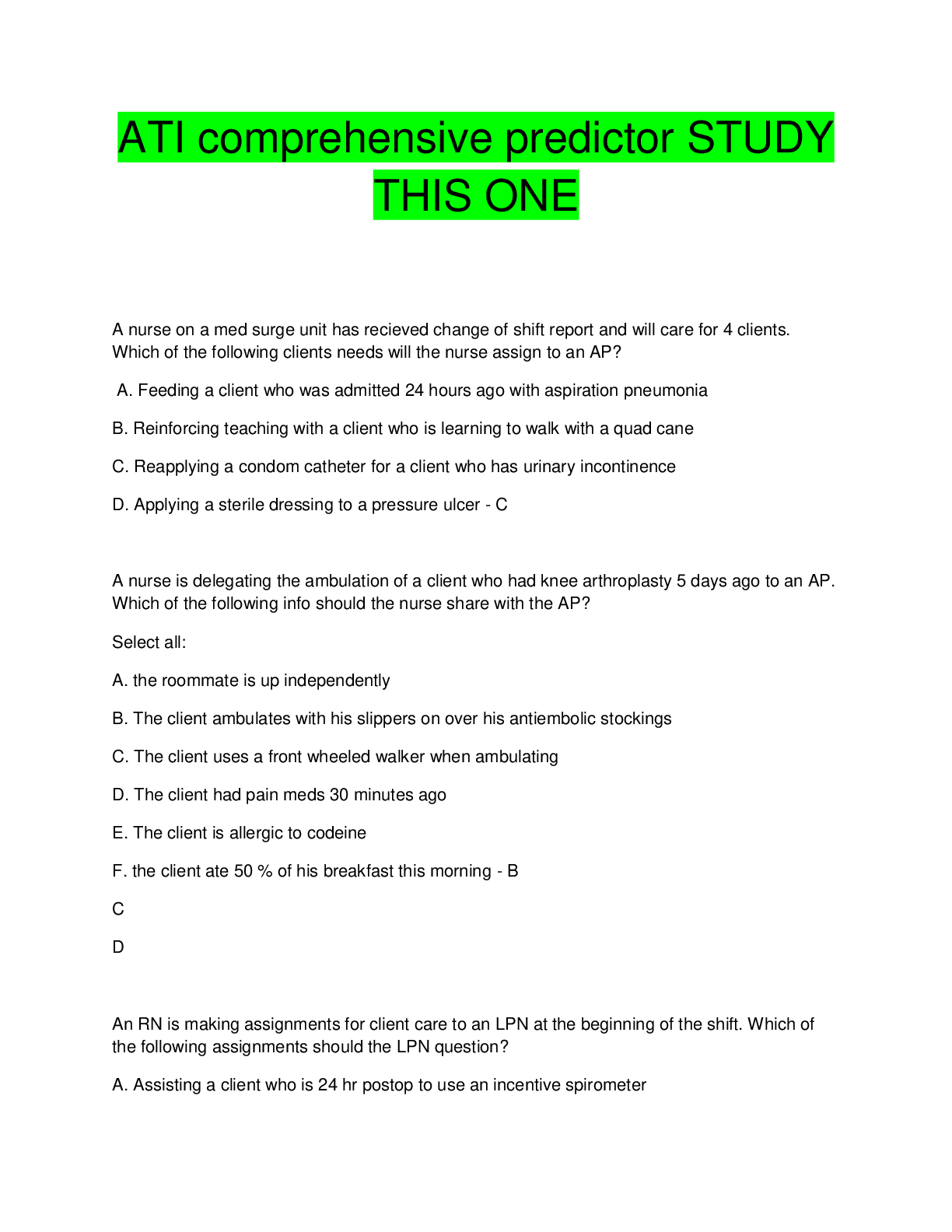*NURSING > EXAM > St. Petersburg College NUR MISC Pharmacology-Quiz - 300 Questions well answered (All)
St. Petersburg College NUR MISC Pharmacology-Quiz - 300 Questions well answered
Document Content and Description Below
Question 1 A patient has been selected as a potential recipient of an experimental drug for heart failure. The nurse knows that when informed consent has been obtained, it indicates which of these? ... Answers: a. The patient has been informed of the possible benefits of the new therapy. b. The patient will be informed of the details of the study as the research continues. c. The patient has had the study’s purpose, procedures, and the risks involved explained to him. d. The patient will receive the actual drug during the experiment. Question 2 During a fishing trip, a patient pierced his finger with a large fishhook. He is now in the emergency department to have it removed. The nurse anticipates that which type of anesthesia will be used for this procedure? Answers: a. No anesthesia b. Topical benzocaine spray on the area c. Topical prilocaine (EMLA) cream around the site d. Infiltration of the puncture wound with lidocaine Question 3 While monitoring a depressed patient who has just started SSRI antidepressant therapy, the nurse will observe for which problem during the early time frame of this therapy? Answers: a. Self-injury or suicidal tendencies b. Loss of appetite c. Extrapyramidal symptoms d. Hypertensive crisis PHARMACOLOGY QUIZ 1 Question 4 The nurse is reviewing the use of central nervous system stimulants. Which of these are indications for this class of drugs? (Select all that apply.) Answers: a. Neonatal apnea b. Attention deficit hyperactivity disorder (ADHD) c. Depression d. Appetite suppression e. Narcolepsy f. Panic attacks Question 5 Which statements are true regarding the elderly and pharmacokinetics? (Select all that apply.) Answers: a. Gastric pH is less acidic. b. Fat content is decreased because of increased lean body mass. c. Fat content is increased because of decreased lean body mass. d. The number of intact nephrons is increased. e. Gastric pH is more acidic. f. The levels of microsomal enzymes are decreased. g. The number of intact nephrons is decreased. Question 6 When giving a buccal medication to a patient, which action by the nurse is appropriate? (Select all that apply.) Answers: a. Placing the medication between the upper or lower molar teeth and the cheek b. Encouraging the patient to swallow, if necessary 2 c. Placing the tablet under the patient’s tongue and allowing it to dissolve completely d. Administering water after the medication has been given Question 7 Which nursing diagnosis is appropriate for the patient who has just received a prescription for a new medication? Answers: a. Deficient knowledge related to newly prescribed drug therapy b. Noncompliance related to new drug therapy c. Impaired memory related to new drug therapy d. Lack of knowledge regarding newly prescribed drug therapy Question 8 During an assessment, the patient tells the nurse that he eats large amounts of garlic for its cardiovascular benefits. Which drug or drug class, if taken, would have a potential interaction with the garlic? Answers: a. Insulin b. Sedatives c. Antilipemic drugs d. Acetaminophen (Tylenol) Question 9 The nurse is reviewing the criteria for over-the-counter drugs. Which criteria for over-the-counter status in the United States are accurate? (Select all that apply.) Answers: a. The drug must be easy to use. b. The consumer must be able to monitor the drug’s effectiveness. c. The drug must have a low potential for abuse. d. The drug must have a low therapeutic index. 3 e. The drug must not have any interactions with other drugs. Question 10 The nurse is monitoring a patient who is in the 26th week of pregnancy and has developed gestational diabetes and pneumonia. She is given medications that pose a possible fetal risk, but the potential benefits may warrant the use of the medications in her situation. The nurse recognizes that these medications are in which U.S. Food and Drug Administration pregnancy safety category? Answers: a. Category C b. Category X c. Category B d. Category D Question 11 A patient has been taking phenobarbital for 2 weeks as part of his therapy for epilepsy. He tells the nurse that he feels tense and that “the least little thing” bothers him now. Which is the correct explanation for this problem? Answers: a. These are adverse effects that usually subside after a few weeks. b. The drug must be stopped immediately because of possible adverse effects. c. This drug causes the rapid eye movement (REM) sleep period to increase, resulting in nightmares and restlessness. d. This drug causes deprivation of REM sleep and may cause the inability to deal with normal stress. Question 12 A patient has experienced insomnia for months, and the physician has prescribed a medication to help with this problem. The nurse expects which drug to be used for long-term treatment of insomnia? Answers: a. Secobarbital (Seconal), a barbiturate b. Diazepam (Valium), a benzodiazepine c. Eszopiclone (Lunesta), a nonbenzodiazepine sleep aid [Show More]
Last updated: 2 years ago
Preview 1 out of 34 pages

Buy this document to get the full access instantly
Instant Download Access after purchase
Buy NowInstant download
We Accept:

Reviews( 0 )
$13.00
Can't find what you want? Try our AI powered Search
Document information
Connected school, study & course
About the document
Uploaded On
Oct 26, 2022
Number of pages
34
Written in
Additional information
This document has been written for:
Uploaded
Oct 26, 2022
Downloads
0
Views
50

